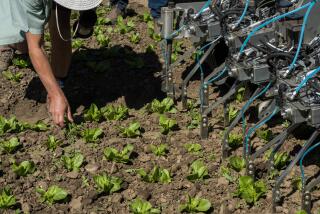Farmers Embracing Biotech Crops
- Share via
TAMPA, Fla. — American farmers are embracing biotech crops as the wave of the future, confident they can woo skeptics at home and abroad, a government official said Sunday.
“Biotechnology is revolutionizing agriculture,” U.S. Department of Agriculture Secretary Dan Glickman told thousands of producers who met here for three days at a joint convention of the National Corn Growers Assn. and the American Soybean Assn.
New genetically altered soybeans and corn are being lapped up by American farmers seeking to raise yields and cut costs by using less pesticides. Policymakers say biotech products are the key to meeting world food needs.
“We need to do more to educate people, to get them confident in our science-based review process and then raise the awareness of the promise of biotechnology to protect our environment and feed our people,” Glickman said.
Agribusinesses are going full throttle on research and development. Executives at DuPont Agricultural Products predicted biotechnology will become a big part of the company’s $2.5-billion global business in the years ahead.
“We have a positive story to tell. This industry is just at the beginning,” DuPont’s Terry McDaniel said.
Monsanto Co., creator of the herbicide-resistant Roundup Ready soybean, estimates those beans will be planted in about 8 million to 10 million acres this season, or about 15% of total U.S. soybean acreage.
That is up sharply from about a million acres in 1996, the first year the biotech product hit the market.
Illinois farmer Bill Voorhees said he plans to plant eight times the amount of Roundup Ready soybeans this year as he did last year. “I’m not leery of biotech. I think it’s a good thing, provided the Europeans are going to buy them,” he said.
The European Union has been approving imports of genetically altered crops on a case-by-case basis. Roundup Ready beans and Ciba-Geigy’s Bt corn, which resists a pest called the European corn borer, have been given the go-ahead.
Last month, however, the French government banned its farmers from growing genetically altered corn, saying its long-term effects had not been determined. On a recent visit to Rome for a world hunger conference, Glickman was pelted with grain by anti-biotech protesters.
In the United States, consumer groups want biotech products labeled, at least.
“Consumers want to be able to distinguish in the marketplace between products which are bioengineered and those which are the way nature designed them,” said Caroline Smith DeWaal of the Center for Science in the Public Interest.
Upcoming biotech crops are said to enhance plant value. DuPont will grow a soybean in Iowa this summer that produces an oil that lasts longer and is lower in saturated fats.
Farmers will be able to produce foods that are better tasting and more nutritious through biotechnology, said David Erickson, head of the soybean association.
Financial considerations also underpin the great leap forward. Last year’s legislative overhaul of U.S. farm policy removed almost all federal controls on what farmers could grow but also peeled away much of the federal safety net.
More to Read
Sign up for Essential California
The most important California stories and recommendations in your inbox every morning.
You may occasionally receive promotional content from the Los Angeles Times.













